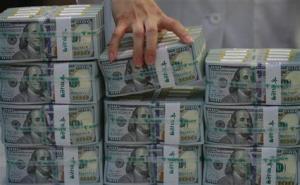Another name for U.S. dollars is greenbacks During the middle of July, South Korea witnessed a consecutive two

During the middle of July, South Korea witnessed a consecutive two-month rise in its foreign exchange reserves, reflecting an increase of US$350 million. This surge can be attributed to the upward valuation of foreign currency assets against the backdrop of a weakened U.S. dollar, particularly against the euro and other currencies.
According to data released by the Bank of Korea on Aug. 3, the total foreign exchange reserves stood at US$421.8 billion at the end of last month, an increase of U$350 million compared to the previous month. While foreign currency deposits in financial institutions decreased, the evaluation of other currencies against the U.S. dollar contributed to the growth of foreign exchange reserves, as explained by the bank.
The U.S. Dollar Index, a metric gauging the dollar’s standing against a basket of major six currencies, experienced a decline of 1.7 percent over the course of a month, from the conclusion of June at 103.34 to the close of July at 101.62. Simultaneously, the euro posted a notable appreciation of 1.5 percent against the dollar throughout the last month, while both the British pound and the Japanese yen experienced gains of 1.9 percent and 2.7 percent, respectively.
Analyzing the composition of foreign exchange reserves in terms of asset allocation, securities including government bonds and liquid securities backed by public guarantees surged to US$376.5 billion, marking an increase of US$890 million compared to the preceding month and accounting for a whopping 89.3 percent of total reserves. Nevertheless, foreign currency deposits, which are considered cash equivalents, in financial institutions dropped by US$600 million to US$20.96 billion, marginally trimming their overall share. Additionally, the foreign exchange reserves encompassed International Monetary Fund (IMF) Special Drawing Rights (SDR) valued at US$14.81 billion, gold holdings valued at US$4.79 billion, and funds available through the IMF’s contribution mechanism (IMF position) amounting to US$4.71 billion.
Meanwhile, as of the end of June, South Korea moved up from 9th to the 8th in the global ranking of foreign exchange reserves. This elevation was prompted by a consecutive three-month decline in Hong Kong’s reserves since April, resulting in an alteration of positions. China maintained its position at the top with foreign exchange reserves amounting to US$3.193 trillion, showing a growth of US$16.5 billion in June. On the other hand, Japan, which ranked second with US$1.247 trillion, encountered a decrement of US$7.3 billion. This decrease has prompted speculation about possible market interventions by Japan’s foreign exchange authorities, ostensibly aimed at safeguarding the yen’s valuation.
www.businesskorea.co.kr
